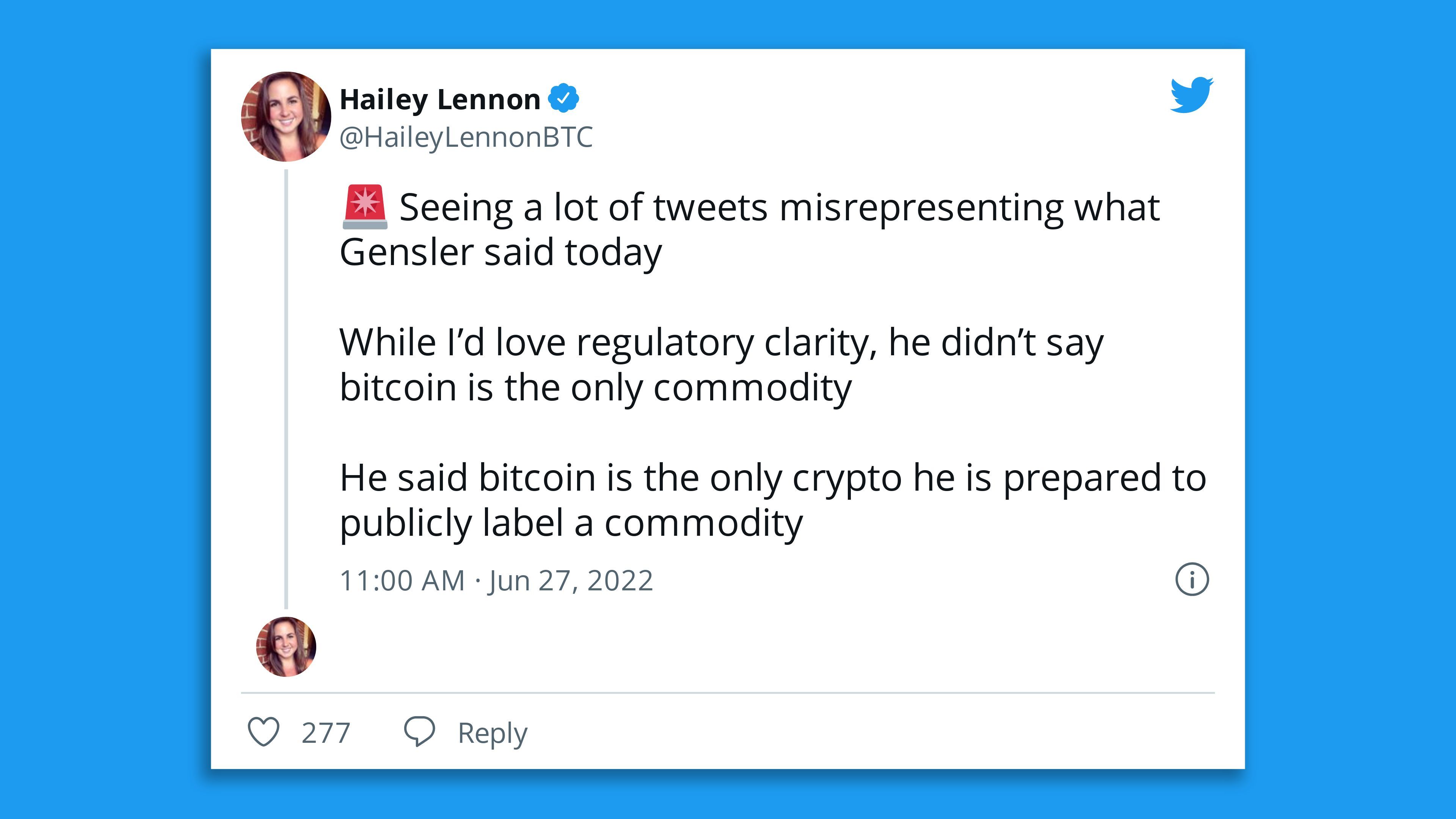Monday morning, the chairman of the U.S. Securities and Exchange Commission (SEC), Gary Gensler, said on CNBC’s Squawk Box that the only token he would lump in with commodities was bitcoin.
Why it matters: Gensler pointedly declined to name any cryptocurrency other than the original one, notable because the market has been operating under the assumption that there is a sort of wink-and-nod understanding that ether is also not a security.
Driving the news: “Many of these financial assets, crypto assets, have the key attributes of a security… some like bitcoin, and that’s the only one, Jim, I’m going to say, because I’m not going to talk about any of these tokens, my predecessors and others have said they’re a commodity,” Gensler said.
Meanwhile, other token communities besides ether have also been cautiously optimistic that their own assets might qualify for treatment as a commodity.
- For example, Hiro, the company behind the issuance of the STX token, notified the SEC in early 2021 that it would no longer treat its cryptocurrency as a security.
- Commodities can be traded by anyone. Securities can only be traded by accredited investors (basically, rich people) unless they are on public markets (such as stocks), which is an expensive pain.
The SEC did not respond to a request for comment and clarification from Axios.

Zooming out: Ethereum was launched with a fundraiser in 2014 that most see now as a securities offering. The question is whether it has become a commodity, and whether that answer provides the regulatory roadmap for other cryptocurrencies.
- In 2018, William Hinman, then the director of the SEC’s division of Corporate Finance, gave a speech in which he expressed his opinion that the coin of the world’s second most valuable blockchain, Ethereum’s ether, was not a security any longer. Hinman said:
- “Based on my understanding of the present state of Ether, the Ethereum network and its decentralized structure, current offers and sales of Ether are not securities transactions.”
- Elsewhere in the speech, Hinman explained: “If the network on which [a] token or coin is to function is sufficiently decentralized — where purchasers would no longer reasonably expect a person or group to carry out essential managerial or entrepreneurial efforts — the assets may not represent an investment contract.”
What they’re saying: “Chair Gensler’s refusal to acknowledge that many digital assets aside from bitcoin are commodities is perplexing,” Jake Chervinsky, policy lead at the Blockchain Association, told Axios via a spokesperson. “In our view, the law is clear that ether — and many other digital assets like it — are not securities subject to SEC jurisdiction.”
The other side: Preston Byrne, of the law firm Preston Byrne, sees it differently. “Ethereum, without a doubt, started its life being regulated as a security. Nobody can point to an event which changes that. TBD whether Gensler does something about it,” he told Axios via text message.
The intrigue: That speech has turned out to be a crucial matter in the SEC’s 2020 case against Ripple, the originator of the XRP cryptocurrency, currently the seventh most valuable.
- That said, the judge in that case agreed the speech reflected Hinman’s views and not of the SEC. “The question of whether Hinman’s speech reflected his own opinion or the agency’s is settled … Although Hinman and the SEC admit that agency staff discussed his speech, it appears that this speech was ‘merely peripheral to actual policy formation.'”
- The SEC does not, at this point, have any official position on whether or not any cryptocurrency is or isn’t a security. That said, as an agency with a heavy case load, such hints are a sign of what enforcement actions its likely not to take.
Our thought bubble: This is court intrigue. President Biden’s executive order largely leaned on Treasury and a few other agencies for sorting out cryptocurrency policy and the Lummis-Gillibrand bill before the U.S. Senate signals an intent to make blockchains largely the CFTC’s remit.
- A former SEC staffer that requested not to be named told Axios the statements read as an attempt to protect his turf as DC appears to be looking to other agencies to reign in the crypto industry.




